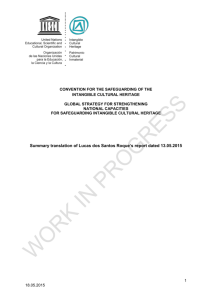Intangible Heritage (2003)
advertisement
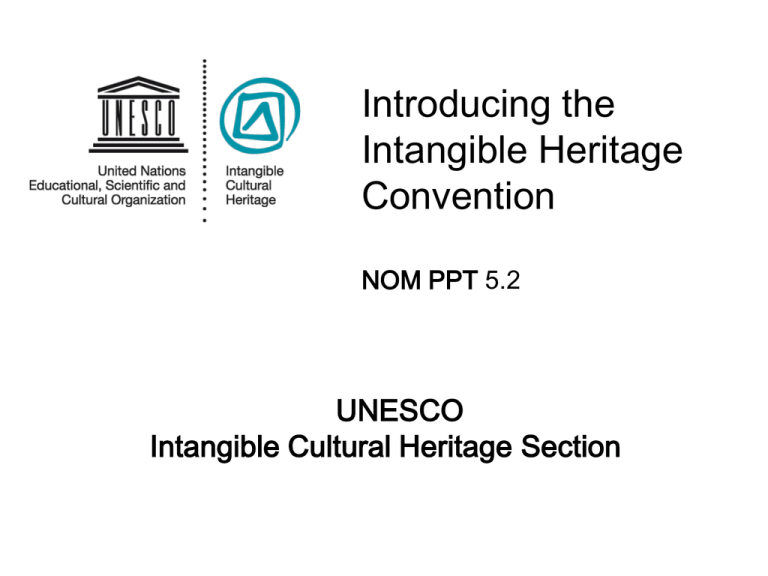
Introducing the Intangible Heritage Convention NOM PPT 5.2 UNESCO Intangible Cultural Heritage Section UNESCO and its conventions The Woodcrafting Knowledge of the Zafimaniry, © J. Ségur/ZED The Intangible Heritage Convention Objectives Governing organs Two Lists and a Register Operational Directives The Fund Obligations and benefits UNESCO and its Conventions Inter-governmental organisation with 193 member states Education, sciences, culture and communication 7 UNESCO conventions in the area of culture and heritage • tangible, intangible and natural heritage • diversity of cultural expressions Three related UNESCO Conventions 1. Convention concerning the Protection of the World Cultural and Natural Heritage (1972) 2. Convention for the Safeguarding of the Intangible Cultural Heritage (2003) 3. Convention on the Protection and Promotion of the Diversity of Cultural Expressions (2005) World Heritage (1972) Conservation of Intangible Heritage (2003) Safeguarding of immovable heritage and expressions, skills, practices, places knowledge Cultural and/or natural Cultural and/or social Outstanding universal Communities define value as value relevant to them Authenticity, integrity help People enact and transmit, to define value, often so ICH changes over time limiting change Cultural diversity (2005) Intangible Heritage (2003) Cultural activities, goods Skills, practices, expressions, knowledge and services (products) ICH is a collective Cultural expressions practice, transmitted over often new, individual at least one generation creations Focus on safeguarding Focus on cultural industries, dissemination practice and transmission of ICH and development The Intangible Heritage Convention Preamble Objectives (art.1) Definitions (art.2) Governing organs (art.4-8) Safeguarding – national (art.11-15) Lists and Register (art.16-18) International assistance and cooperation (art.19-28) Reporting (art.29-30) Ratification etc. (art.32-33) Safeguarding Respect Awareness Mutual appreciation International cooperation and assistance Two Lists and a Register Urgent Safeguarding List Representative List Register of Best Practices The Sanké mon collective fishing rite takes place annually in the Ségou region of Mali to mark the beginning of the rainy season and commemorate the founding of the town San. © Direction nationale du patrimoine culturel, Ministère de la culture du Mali In recent years, fewer people attend the rite, because of decreasing awareness of its function and history, occasional accidents and the degradation of the Sanké Lake The Tango is a symbol of the popular culture of Argentina and Uruguay, especially their capital cities. Originating in working class neighbourhoods of Buenos Aires, the Tango dates back to the late nineteenth century. Practiced spontaneously or in more formal settings, it enjoys great popularity locally and worldwide. © 2008, by Ministerio de Cultura Ciudad de Buenos Aires Guided by teachers, children explore the rich heritage of Elche by working with tradition-bearers and documenting their heritage. . General Assembly: sovereign body of the Convention. All States Parties are members. Intergovernmental Committee: 24 states members, implement the Convention. UNESCO Secretariat assists in implementation of the Convention Include regulations and procedures for Lists and Fund Prepared by Committee, approved by General Assembly First set approved 2008; amended and enlarged 2010 . Guide implementation of the Convention States Parties contribute to the Fund Some States make additional contributions Few requests for assistance received so far . Mainly supports safeguarding, inventory making, capacity building In Articles 11-15 and 26-29 of the Convention, can you identify where it says States Parties shall ... States Parties shall endeavour to ... Safeguard ICH on its territory Ensure community participation in identifying and safeguarding Identify, define and inventory ICH in its territory Contribute to the ICH Fund Report to the Committee . • • • • • • Safeguarding International assistance Nominating elements International cooperation Sharing expertise Participating in the organs of the Convention . The Convention aims to: Safeguard the ICH Promote cultural diversity, human creativity, mutual understanding, and international cooperation Underscore the role of communities of traditionbearers in the definition, enactment, transmission and safeguarding of their ICH . The Convention: Is run by an Intergovernmental Committee, controlled by a General Assembly and assisted by the UNESCO secretariat It has Operational Directives, a Fund, two Lists and a Register of Best Practices Brings both obligations and benefits to the States Parties
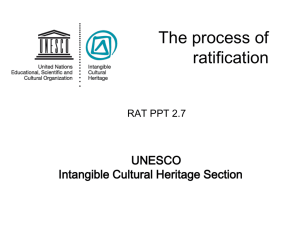
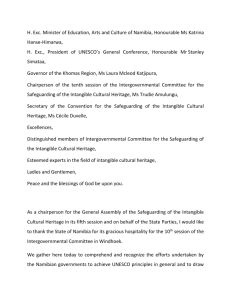
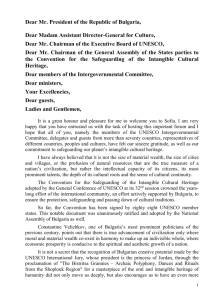
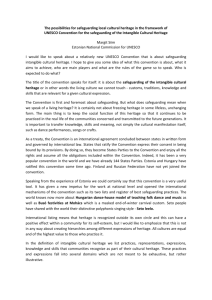
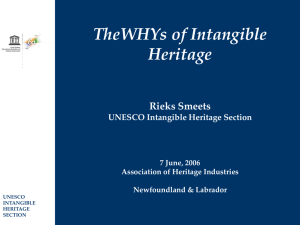
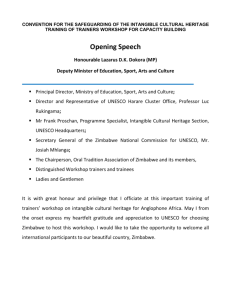
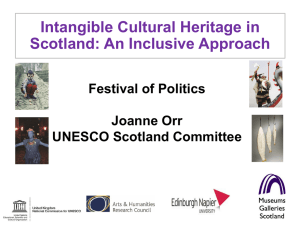
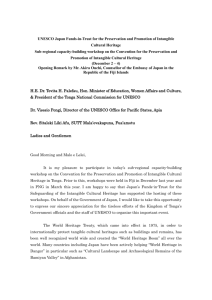
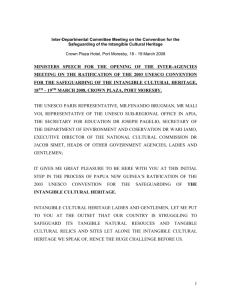
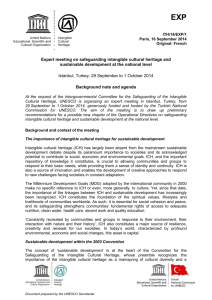
![Structure Operational Directives [Article 7(e)]](http://s3.studylib.net/store/data/007343567_1-f0ac6942f9a623f9ff0cf296a6ab024d-300x300.png)
